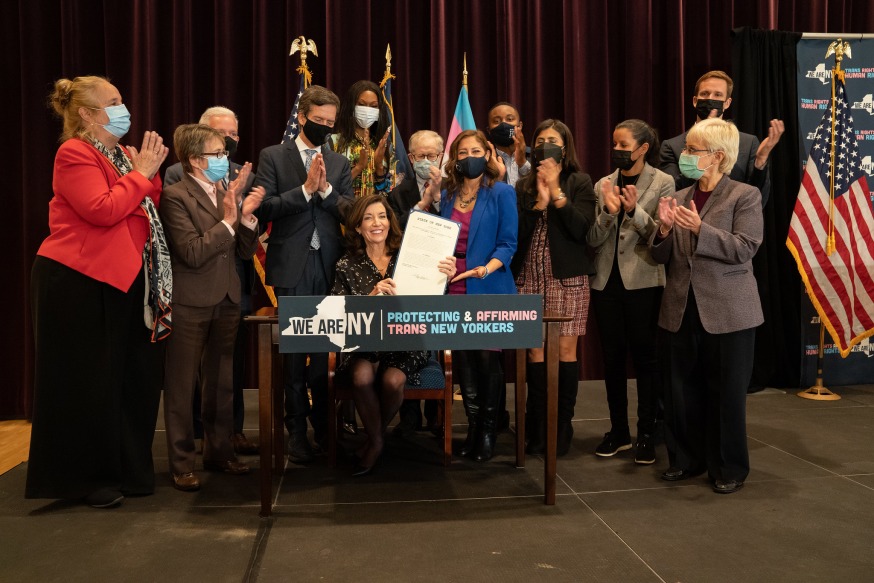
Gov. Kathy Hochul is joined by Queens and city legislators as she signed two bills aimed at protecting trans New Yorkers into law (Don Pollard – Office of Governor Kathy Hochul)
Nov. 18, 2021 By Allie Griffin
Governor Kathy Hochul signed two bills sponsored by Queens legislators Tuesday that aim to protect LGBTQ+ New Yorkers.
Hochul signed the bills into law during transgender awareness week.
The first bill, sponsored by Sen. Jessica Ramos and known as the START Act, strengthens protections for victims of sex and labor trafficking — many of whom are trans.
It builds upon a 2010 state law that allowed such victims to vacate prostitution-related convictions tied to their victimization. The START Act expands the types of criminal convictions — beyond prostitution and related charges — that may be vacated when the defendant is or was a trafficking victim.
For example, trafficking victims often are convicted of possessing false documents often at the direction of their trafficker who confiscates their real documents. The new law will allow courts to vacate such a conviction.
The START Act also ensures that court hearings to vacate such offenses are confidential.
“The START Act gives survivors of trafficking the fresh start they deserve — lessening the barriers to employment, improving access to appropriate immigration legal remedies, and helping break cycles of trauma for thousands of survivors across our state,” Ramos said in a statement.
Queens Council Member-elect Tiffany Cabán, who is queer, applauded the bill’s signage.
“Decriminalization is an LGBT issue that moves us towards humanizing all survivors of oppressive systems,” Cabán said in a statement. “As an incoming queer Councilmember of color, it’s an honor to stand with advocates today as we move closer towards that purpose.”
The second bill Hochul signed was sponsored by Assembly Member Jessica González-Rojas. It gives New Yorkers the right to be addressed by their preferred name and pronoun by certain utility companies.
The legislation requires utility corporations, municipalities, water-works corporations, and telephone service providers to give customers an option to provide their preferred names and pronouns for all written and oral communications.
The legislation is expected to affect more than 78,000 transgender and gender non-conforming residents across the state.
“At a time when we are witnessing a record number of murders of trans people, particularly trans women, and of anti-LGBT pieces of legislation being introduced and passed in other states across the nation, New York must take leadership and stand against hate,” González-Rojas said. “I’m proud to have sponsored legislation, which will ensure that transgender people are respected by utility corporations as they do business in our state.”
Hochul said she hopes New York can be a beacon for the LGBTQ+ community through the new laws and beyond.
“As we witness attacks on LGBTQ+ rights and protections around the country, New York is once again declaring that we are a state for all – one where we don’t needlessly criminalize victims and where our trans, gender non-binary, and gender non-conforming communities are affirmed,” Hochul said. “Together we will continue to build a state that is welcoming to all.”
